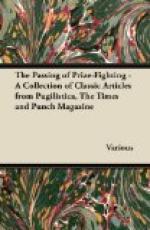For forty years and upwards he has graced
the public scene
Without becoming sterilized or stiffened
by routine;
He still retains his freshness and his
brain is just as keen.
His credit was not shipwrecked on the
fatal Irish reef;
He has always been a loyal and a sympathetic
chief;
And he has also written The Foundations
of Belief.
As leader of the Mission to our cousins
and Allies,
We learn with satisfaction, but without
the least surprise,
That he proved the very cynosure of Transatlantic
eyes.
For the special brand of statesman plus
aristocratic sage,
Like the model king-philosopher described
in PLATO’S page,
Is uncommonly attractive in a democratic
age.
“BALFOUR Must Go!” was once
the cry of those who deemed him slack,
But now there’s not a single scribe
of that unruly pack
Who is not glad in every sense that BALFOUR
has come back.
And as for his “successor”—the
Napoleonic peer
Whose functions are restricted to a purely
business sphere—
We must try to bear his absence in a spirit
of good cheer.
* * * * *
=THE INFANTICIDE.=
From an economic point of view it was inexcusable. I can only hope that the affair will never reach the ear of the new FOOD-CONTROLLER. The chief culprit was undoubtedly Joan minor—I only became an accomplice after the fact—and I can scarcely believe that even a Food-Controller could be very angry with Joan minor. For one thing she really is so very minor. And then there’s her manner; in face of it severity, as I have found, is out of the question. Even Joan major, who has been known to rout our charlady in single combat, finds it irresistible. Indeed when I taxed her with having a hand in the crime she secured an acquittal on the plea of duress.
Ever since Joan minor arrived at years of understanding the weeks preceding the great day have been fraught with a mystery in which I have no share. Earnest conversations which break off guiltily the moment I enter the room; strained whisperings and now and again little uncontrollable giggles of ecstatic anticipation from Joan minor—these are the signs that I have learned to look for, and, being well versed in my part, to ignore with a sublime unconsciousness which should make my fortune in a melodrama of stage asides. And then, on the morning of my birthday, the solemn ceremonial of revelation, I would come in to breakfast, to find a parcel lying by my plate. At first I would not see it. In a tense and unnatural silence Joan minor would follow me with her eyes while I opened the window a few inches, closed it again, stroked the cat and generally behaved as though sitting down at table was the last thing I intended. Then, when I did take my place, “The post is early to-day,” I would say, pushing the parcel carelessly on one side as I took up the paper, while Joan minor hid her face in Joan major’s blouse lest her feelings should betray her into premature speech. And at last I would open it, and my amazement and delight would know no bounds. There was very little acting needed for that. It is no small thing to be spirited back to the age when birthdays really matter.




